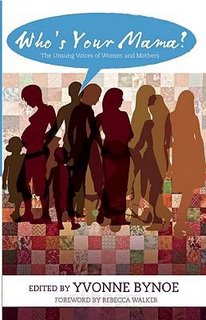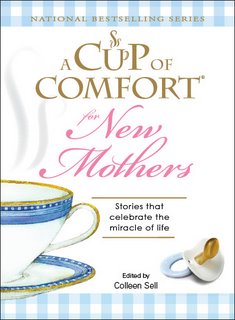
The hardest aspect of editing Mama, PhD was not editing the selections, nor working with the publisher to fine-tune essays, nor copyediting, nor even coordinating all of this work with a coeditor living 3,000 miles away who had two (now three!) kids of her own. No, I think really the hardest part was actually getting the essays. We sent out a call for submissions to our friends, and asked them to send it to their friends; we published it on list-servs and websites and broadcast it as widely as we knew how. It wound up in places that we didn’t even know existed, like the Women and Crime mailing list. But still, many of the essays came from women of similar backgrounds and in similar disciplines as ourselves. For Mama, PhD this wasn’t a deal-breaker: the collection winds up accurately reflecting the diversity of women in higher education. Still, I know there are more stories out there that we didn’t manage to uncover, and I’ll always wonder how we might have found them.
Yvonne Bynoe, who edited Who’s Your Mama: The Unsung Voices of Women and Mothers, found an amazingly diverse group of women to contribute to her anthology. The women are different races and ethnicities; they are single, widowed, divorced and partnered, gay and straight, mothers and childless, at home with their kids and working outside the home. The women are not all professional writers, but they contribute deeply-felt stories which are powerfully told.
Mary Warren Foulk’s piece, “Which One’s the Mother?”, beautifully traces her complicated road to lesbian motherhood, and I loved Kathy Bricetti’s sweet essay, “The Baby Bank,” about going with her partner to a sperm bank, way back in 1992.
Christine Murphy is resisting friends’ and family pressure to jump on the “baby train” in “Mommy Maybe…” — and wondering if she’s making the right choice. Liz Prato writes poignantly of her decision not to have children in “Is Life Without Kids Worth Living?” With a mother who died at fifty-eight and two aunts who passed away in their forties, she feels that “knowing the parent-child relationship can come to such an abrupt end has shut down our desire to have kids.”
In “The Mother I Always Wanted,” Robin Templeton describes how her pregnancy makes her finally confront the reality of her own troubled mother; sitting on an airplane on the way back home, she writes, “I fanned myself with the laminated safety instructions, closed my eyes and a neon warning scrolled behind them like an interruption from the Emergency Broadcast System: Beep. This is a test. Beep. You are your mother’s chid. Beep. Your baby will be raised by a woman raised by your mother.”
Eileen Flanagan also addresses the legacy of difficult mothering in her essay, “A Pellet of Poison: I Don’t Want to Feed Racism to My Children the Way My Mother Fed It to Me.” Untangling what she was taught from what she wants to teach her children, she searches out slave narratives, abolitionist histories, novels and songs; she writes, “In the realm of race, I can also face the heat of my family history, sweating out whatever I’ve absorbed and teaching my children to do the same. Stories are like saunas that can help draw the poison out of us.”
And I loved Lisa Chiu’s essay “Ching Chong!” which hopes her son won’t hear the playground taunt that haunted her childhood: “Nico’s classmates haven’t yet asked him where he’s from. But when they do ask–and they will–I hope he will answer the question with clarity and confidence. I hope he will respond in a way that educates people, informing them not just of his own cultural background but of a world that is multi-hued, complex, and complicated.
“It took me years to come up with my own succinct answer to the question, replying that I’m a second-generation Taiwanese American woman who was born in Canada and raised in Cleveland. It took a long time for me to learn how to define myself. Now, it is time for me to guide my son along his cultural identity journey. I know where we’re from. And I’m gaining clarity in knowing where we’re going.”
I like these essays for asking good questions rather than presuming to have all the answers. These are women in the midst of journeys, and it’s interesting to follow along with their thinking.
Want to read this book? Leave me a comment by Saturday, May 30th, and I’ll choose someone at random to receive my advance galley.







